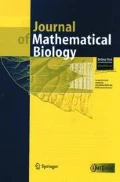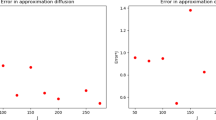Abstract
We consider discrete time stochastic processes defined by solutions to some non-linear difference equations whose coefficients are autocorrelated random sequences. It is proved that these processes converge weakly in D[0, T] to diffusion processes, under the assumption that the random sequences satisfy some mixing condition. Diffusion approximation for stochastic selection models in population genetics is discussed, as the application of this limit theorem.
Similar content being viewed by others
References
Billingsley, P.: Convergence of probability measures. New York: Wiley 1968
Cook, R. D., Hartl, D. L.: Uncorrelated random environments and their effects on gene frequency. Evolution 28, 265–274 (1974)
Crow, J. F., Kimura, M.: An introduction to population genetics theory. New York: Harper and Row 1970
Ewens, W. J.: Mathematical population genetics. New York: Springer 1979
Feller, W.: Diffusion processes in genetics. Second Berkeley Symp. Math. Stat. Prob., pp. 227–246. Berkeley and Los Angeles: University of California Press 1951
Gikhman, I. I.: Convergence to Markov processes. Ukrainian Math. Jour. 21, 263–270 (1969)
Gillespie, J. H.: Natural selection with varying selection coefficients — A haploid model. Genet. Res., Camb. 21, 115–120 (1973a)
Gillespie, J. H.: Polymorphism in random environments. Theoret. Population Biology 4, 193–195 (1973b)
Gillespie, J. H.: A general model to account for enzyme variation in natural populations, V. The SAS-CFF model. Theoret. Population Biology 14, 1–45 (1978)
Gillespie, J. H., Guess, H. A.: The effects of environmental autocorrelations on the progress of selection in a random environment. Amer. Natur. 112, 897–909 (1978)
Guess, H. A.: On the weak convergence of Wright-Fisher models. Stoch. Processes Appl. 1, 287–306 (1973)
Guess, H. A., Gillespie, J. H.: Diffusion approximations to linear stochastic difference equations with stationary coefficients. J. Appl. Prob. 14, 58–74 (1977)
Hartl, D. L.: Mutation — selection balance with stochastic selection. Genetics 86, 687–696 (1977)
Hartl, D. L., Cook, R. D.: Balanced polymorphisms of quasineutral alleles. Theoret. Population Biology 4, 163–172 (1973)
Hartl, D. L., Cook, R. D.: Autocorrelated random environments and their effects on gene frequency. Evolution 28, 275–280 (1974)
Ito, K.: Lectures on stochastic processes. Bombay: Tata Institute of Fundamental Research 1961
Jensen, L., Pollak, E.: Random selective advantages of a gene in a finite population. J. Appl. Prob. 6, 19–37 (1969)
Karlin, S., Levikson, B.: Temporal fluctuations in selection intensities: Case of small population size. Theoret. Population Biology 6, 383–412 (1974)
Karlin, S., Lieberman, U.: Random temporal variation in selection intensities: Case of large population size. Theoret. Population Biology 6, 355–382 (1974)
Kimura, M.: Stochastic processes and distribution of gene frequencies under natural selection. Cold Spring Harbor Symp. 20, 33–53 (1955)
Kimura, M.: Diffusion models in population genetics. J. Appl. Prob. 1, 177–232 (1964)
Kimura, M., Ohta, T.: Theoretical aspects of population genetics. Princeton: Princeton University Press 1971
Kurtz, T. G.: Semigroup of conditioned shifts and approximation of Markov processes. Ann. Probab. 3, 618–642 (1975)
Kushner, H. J., Huang, H.: On the weak convergence of a sequence of general stochastic difference equations to a diffusion. SIAM J. Appl. Math. 40, 528–541 (1981)
Levikson, B., Karlin, S.: Random temporal variation in selection intensities acting on infinite diploid populations: Diffusion method analysis. Theoret. Population Biology 8, 292–300 (1975)
Li, W.-H. (ed.): Stochastic models in population genetics. Pennsylvania: Dowden, Hutchinson and Ross, Inc., 1977
Maruyama, T.: Stochastic problems in population genetics. New York: Springer 1977
Matsuda, H., Gojobori, T.: Protein polymorphism and fluctuation of environments. Adv. Biophys. 12, 53–99 (1979)
Norman, M. F.: Diffusion approximation of non-Markovian processes. Ann. Probab. 3, 358–364 (1975)
Okada, N.: On convergence to diffusion processes of Markov chains related to population genetics. Adv. Appl. Prob. 11, 673–700 (1979)
Papanicolaou, G. C., Kohler, W.: Asymptotic theory of mixing stochastic ordinary differential equations. Comm. Pure Appl. Math. 27, 641–668 (1974)
Sato, K.: Diffusion processes and a class of Markov chains related to population genetics. Osaka J. Math. 13, 631–659 (1976a)
Sato, K.: A class of Markov chains related to selection in population genetics. J. Math. Soc. Japan 28, 621–637 (1976b)
Sato, K.: Convergence of a class of Markov chains to multi-dimensional degenerate diffusion processes. Proc. Intern. Symp. Stoch. Diff. Eq. Kyoto 367–383 (1976c)
Sato, K.: Convergence to a diffusion of a multiallelic model in population genetics. Adv. Appl. Prob. 10, 538–562 (1978)
Serfling, R. J.: Moment inequalities for the maximum cumulative sum. Ann. Math. Statist. 41, 1227–1234 (1970)
Stroock, D. W., Varadhan, S. R. S.: Multidimensional diffusion processes. Berlin: Springer 1979
Takahata, N., Ishii, K., Matsuda, H.: Effect of temporal fluctuation of selection coefficient on gene frequency in a population. Proc. Nat. Acad. Sci. USA 72, 4541–4545 (1975)
Trotter, H. F.: Approximation of semi-groups of operators. Pacific J. Math. 8, 887–919 (1958)
Watterson, G. A.: Some theoretical aspects of diffusion theory in population genetics. Ann. Math. Statist. 33, 939–957 (1962)
Author information
Authors and Affiliations
Rights and permissions
About this article
Cite this article
Iizuka, M., Matsuda, H. Weak convergence of discrete time non-markovian processes related to selection models in population genetics. J. Math. Biology 15, 107–127 (1982). https://doi.org/10.1007/BF00275792
Received:
Revised:
Issue Date:
DOI: https://doi.org/10.1007/BF00275792



